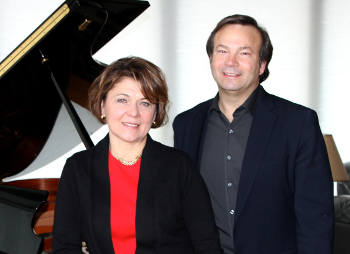
Profs Tom Knific and Renata Artman Knific from the Western
Michigan University School of Music are visiting the Odeion
School of Music at the University of the Free State.
Photo: Supplied
The renowned Knific Duo will not only perform at the University of the Free State (UFS) soon, but will also share their expertise at the Odeion School of Music (OSM). The duo, consisting of Profs Tom Knific and Renata Artman Knific, from the prestigious Western Michigan University School of Music, are presenting a masterclass series hosted by the OSM Concert Agency. The series takes place from 10-14 May 2017 and the concert on 16 May 2017.
Concert features local pianists
The first half of the concert on 16 May 2017 will present a programme leaning towards the classical genre. Apart from three works composed by Prof Knific, it will also include two movements from the Violin Sonata by the Hungarian composer Miklós Rózsa.
In the second half Prof Knific will collaborate with two local pianists, the legendary jazz pianist, composer and music educator, Noel Stockton, and the talented Andile Qongqo, and for a carefully curated jazz programme mainly from the oeuvre of Prof Knific. Random Dreams, a work composed by Stockton will also be included.
Well-known around the world
Prof Knific (double bass) is a Professor at the Department of Jazz at the Western Michigan University School of Music. He has been principal bassist of orchestras from the US to Europe and performed as a soloist and in chamber music festivals around the world. He also is a former president of the International Society of Bassists.
Prof Artman Knific (violin) is a professor of violin at the same institution. Her international career began in London at 21 when she joined the English Chamber Orchestra. Tours of Europe, North and South America and Asia followed where she collaborated with artists such as Herman Bauman and Isaac Stern. She has worked with conductors such as Daniel Barenboim and Christoph Eschenbach, and recorded records for EMI, Decca, and CBS labels.
Date: 16 May 2017
Time: 19:30
Place: Odeion (Bloemfontein Campus)
Musicians interested in masterclasses can contact Ninette Pretorius at pretoriusn@ufs.ac.za